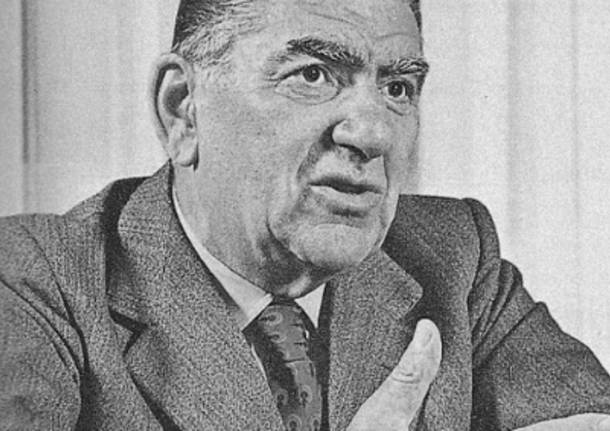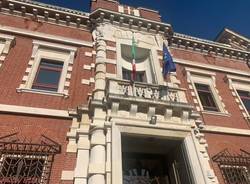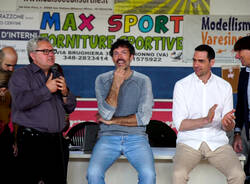“Borghi, Ignis and me: when Comerio was the world”
Who better than Caterina Ossola, the 86-year-old, former secretary of Giovanni Borghi, would know what Ignis was for this territory?

Now that Whirlpool is no longer in Comerio … it is a time for memories. Who better than Caterina Ossola, the 86-year-old, former secretary of Giovanni Borghi, would know what Ignis was for this territory?
How do you feel, today, seeing Whirlpool abandon their historic location in Comerio?
“Today, I have no words to describe the end of the factory in Comerio, just great sadness. But I understand that Whirlpool has to grow and has chosen a more convenient place, with more technology. All the same, I’ve felt nostalgia in the last few days,” Caterina said. “I joined Ignis at the age of 16, in 1946, after middle school, because I lived in the village and there were rumours that the Borghis, from Milan, who had a holiday home here, in Oracco, were producing and selling gas cookers. I joined them, to learn the job of clerk, but in 1948, when they began to produce electric cookers, an electricity crisis throughout Italy put the firm in great difficulty.
“They had to lay people off, and they sent me home for two months, because, they said, my parents were farmers, and with the land and animals, they could feed me. After two months, they called me back, and I soon became the personal secretary of Giovanni Borghi, and my sister handled the financial side. I lived through some incredible years in that firm with Mr. Borghi, I remember everything that happened in Ignis, from the first, to the last day, from A to Z.”
Caterina Ossola is remembered by all of the old employees, as the acting boss, the person Mr. Borghi had full and unconditional trust in.
“The first real success came with the gas cookers,” she explained. “We joined the sales network of a big gas society with 53 dealerships, and we started selling the product all over Italy. The lorries came to Comerio, queuing up to take the cookers away. We started to expand, the gas stoves and fridges, and the factories of Cassinetta, Siena, Naples and Barcelona were opened. Already in 1954, we put compressors in the fridges. Initially, we made them in Gavirate, in former military barracks. Giovanni Borghi followed everything from Comerio, his dad followed the money, his younger brother followed the fridge production, and then there was the brother, who died in Via Monte Ceneri, in Milan, who crashed his car into a tram.”
Was the bond between Ignis and Comerio strong?
“It was a bond with the Borghi family. The firm was founded in 1943, but it started in Comerio in 1946. Before the war, Comerio was a holiday place for them. They already came to the hill in Orocco, for holidays. At that time, there was just farming and a pipe factory here.”
Already in the ’70s, there was the first turning point.
“Philips curried favour with us. They took on 50%, but in order to make any kind of investments, we needed their approval. But they always said no, because they wanted to buy the company at a more interesting price. In 1972, Borghi decided also to sell the other part of Ignis. He wouldn’t have sold if it hadn’t been for his health.”
Did he confide in you that he was ill?
“Yes. One day he called me into his office and he drew me something on the desk. He said, look, I have to have this operation. He had a bladder tumour e he was heartbroken.
Was the factory his life?
“Yes, every morning and every afternoon, he liked to experience the factory. He knew everyone and everything. So did I, actually. It was he who decided everything. He’d talk to an employee, for example, asking him what he thought of a particular device or mechanism. When he came back from the USA with the idea of putting expanded polyurethane into the fridges, he revolutionised everything in a month. By the end of the summer, the product had changed.”
What about the family?
“His brother didn’t want to buy the factory in Naples and they parted ways. I remember a big argument that lasted until 10 p.m., he pulled out the sheet of paper, with how much he owed his brother Gaetano, and put it on the table. He did return often to the factory, there were no scenes, but that piece of paper stuck in my mind.”
What do you think they should do in the former premises in Comerio?
“I think they should make it into small workshops, maybe for production. There are a lot of technicians in this area, who could help new small businesses.”
“What did you do after Ignis?”
“I founded a company, Riviera, which sells fridges, and which makes and installs systems. In 1976, I sold fridges to all of the customers we had at Ignis. I made a deal with some great Syrians, a plant in Latakia, and I’ve been working with them for many years. We built a factory for them, to make fridges, but they also a have a plant, with which they work for Pepsi Cola, which was bombed. They wanted to rebuild it with a German company, but they were afraid. So they called us. I sent technicians to Latakia, and we rebuilt it. We Italians produced the plant, with a lot of Chinese parts, and, in 5 months, we assembled it. For the last month, they’ve been turning out up to 22,000 bottles in 4 hours. For that job, we had to provide insurance cover against death for the technicians. A few years ago, with the old technicians from Ignis, I got a factory built in Algeria, to produce 300 fridges per day. So, as you can see, I still like working.”
La community di VareseNews
Loro ne fanno già parte
Ultimi commenti
lenny54 su A Varese Salvini prova a ricucire passato e futuro della Lega, ma Bossi non c'è
PaoloFilterfree su A Varese Salvini prova a ricucire passato e futuro della Lega, ma Bossi non c'è
axelzzz85 su A Varese Salvini prova a ricucire passato e futuro della Lega, ma Bossi non c'è
elenera su A Varese Salvini prova a ricucire passato e futuro della Lega, ma Bossi non c'è
Roberto Colombo su A Varese Salvini prova a ricucire passato e futuro della Lega, ma Bossi non c'è
flyman su Quarant’anni di Lega e quelle scritte nel paese del “Capo“














Accedi o registrati per commentare questo articolo.
L'email è richiesta ma non verrà mostrata ai visitatori. Il contenuto di questo commento esprime il pensiero dell'autore e non rappresenta la linea editoriale di VareseNews.it, che rimane autonoma e indipendente. I messaggi inclusi nei commenti non sono testi giornalistici, ma post inviati dai singoli lettori che possono essere automaticamente pubblicati senza filtro preventivo. I commenti che includano uno o più link a siti esterni verranno rimossi in automatico dal sistema.